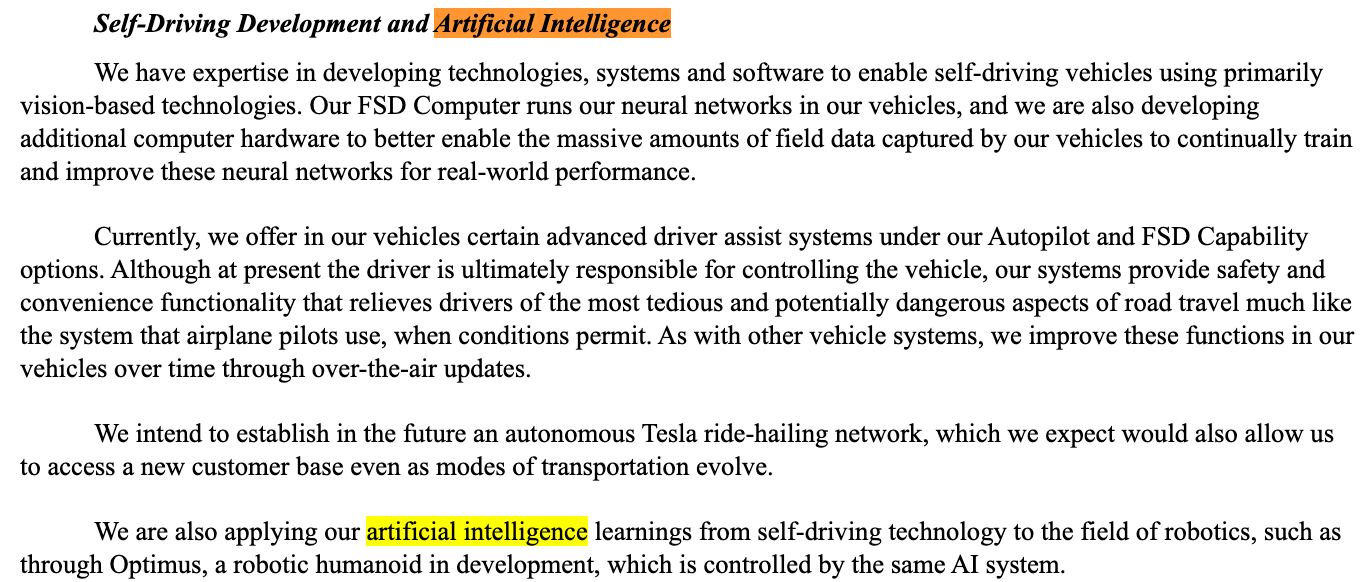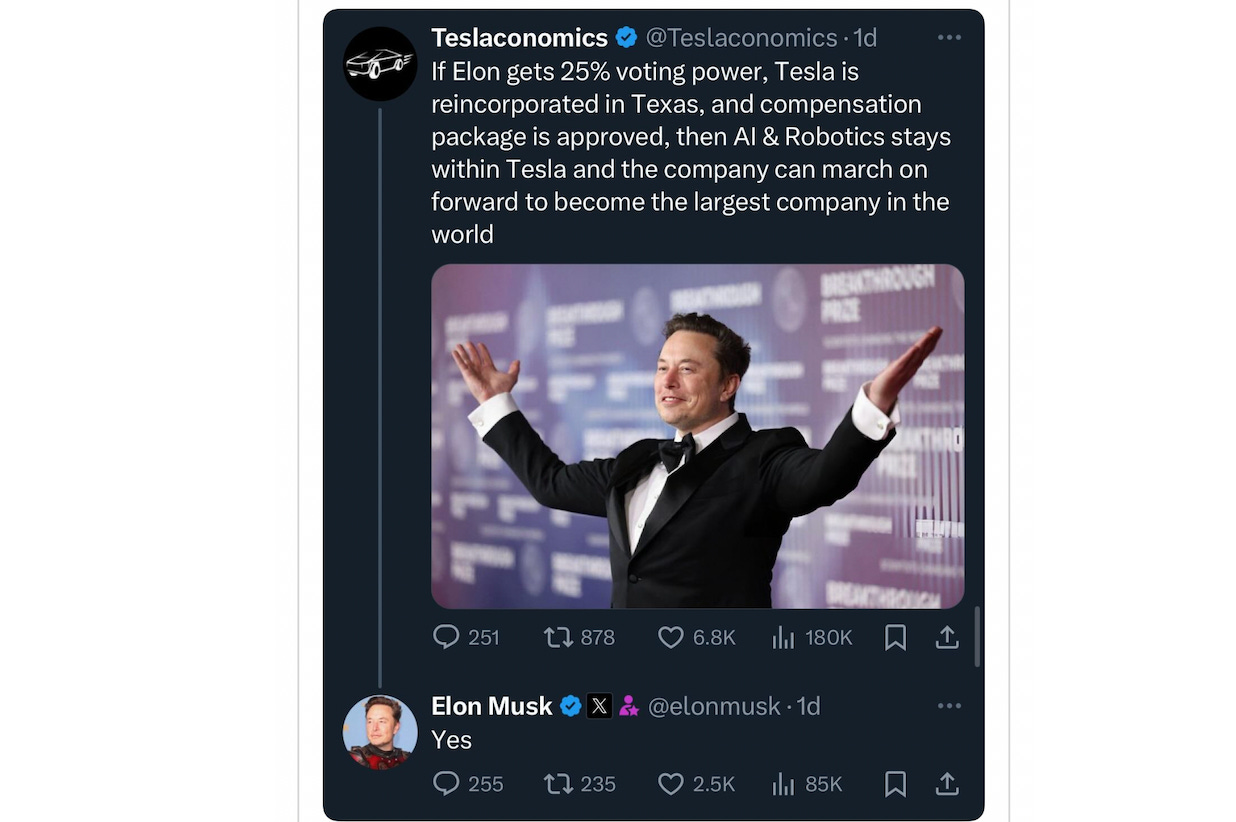Elon Musk Is Brazenly Stealing from Tesla
Well-established law prohibits a fiduciary from appropriating opportunities that belong to the corporation. Yet Elon Musk is doing just that, while throwing in some nasty extortionate threats.
It’s time to discuss the so-called corporate opportunity doctrine. The classic statement of the doctrine is from the oft-cited case of Guth v. Loft, decided in 1939 by the Court of Chancery of Delaware:
“if there is presented to a corporate officer or director a business opportunity which the corporation is financially able to undertake, is, from its nature, in the line of the corporation's business and is of practical advantage to it, is one in which the corporation has an interest or a reasonable expectancy, and, by embracing the opportunity, the self-interest of the officer or director will be brought into conflict with that of the corporation, the law will not permit him to seize the opportunity for himself.”
I. Both AI & Robotics Are Tesla Corporate Opportunities
The burning question concerns Tesla’s interest in developing artificial intelligence (or AI). In Robyn Denholm’s letter introducing Tesla’s proxy statement for the June 13 annual meeting, she is quite clear that Tesla has such an interest. She writes that Tesla is looking hard at reducing costs and increasing efficiency (emphasis added via capitalization):
“This action will prepare us for our next phase of growth, as we are developing some of the most revolutionary technologies in auto, energy and ARTIFICIAL INTELLIGENCE.”
Even more explicitly, Denholm explains why Tesla wants to reincorporate in Texas (emphasis added via capitalization):
“Texas is where we should continue working towards our mission of accelerating the world’s transition to sustainable energy, as we lay the foundation for our growth with our ramp and build of factories for our future vehicles and to help meet the demand for energy storage as well as with OUR PROGRESS IN ARTIFICIAL INTELLIGENCE VIA FULL SELF-DRIVING AND OPTIMUS.”
Now, to be clear, I regard all of this as patent nonsense. Tesla could conduct 100% its manufacturing and R&D efforts in Texas and still be incorporated in Delaware and governed by Delaware’s highly-evolved corporate law principles. The move to reincorporate is all about Elon Musk’s vindictiveness and anger that the Delaware Court of Chancery had the unmitigated gall to apply well-established corporate governance law to his brand of gangster capitalism.
(the gangster capitalist)
But the risible insincerity of Denholm’s explanation is not the point. The point, rather, is that (in the words of Guth v. Loft) artificial intelligence is most certainly a business opportunity that Tesla is capable of undertaking, and that is of practical advantage to Tesla, and in which Tesla has an interest or a reasonable expectancy.
In actual fact, Tesla already is engaged in exploiting the AI opportunity. Indeed, in the text of the proxy statement itself, Musk is lauded as leading Tesla “to groundbreaking innovations in artificial intelligence.”
Turn to the 2023 annual report and what do you find?
On and on it goes. During earnings calls, on social media, and in other places and on other occasions, Musk repeatedly has identified artificial intelligence both as the key to the development of Tesla’s “Optimus” robot and as vital to Tesla’s efforts to develop its Full Self-Driving (FSD) capabilities.
Let’s do Optimus first. This is from the earnings call last month:
“As I've said before, I think Optimus will be more valuable than everything else combined. Because if you've got a sentient humanoid robots that is able to navigate reality and do tasks at request, there is no meaningful limit to the size of the economy. So, that's what's going to happen. And I think Tesla is best positioned of any humanoid robot maker to be able to reach volume production with efficient inference on the robot itself.
“I mean, this, perhaps, is a point that is worth emphasizing Tesla's AI inference efficiency is vastly better than any other company. There's no company even close to the inference efficiency of Tesla. We've had to do that because we were constrained by the inference hardware in the car. We didn't have a choice.
“But that will pay dividends in many ways.”
So, Optimus will be more valuable than everything else combined!
But even more crucial, in the immediate term, is FSD. As we all know, despite incessant price-cutting, Tesla’s deliveries are falling off a cliff, its margins are shrinking, and its cash is being incinerated at an alarming clip. It runs the risk of having investors acknowledge the obvious: Tesla is just another auto manufacturing company. That is, just another entrant in an industry that is capital-intensive, cyclical, low-margin, and highly competitive. And such an acknowledgement, once fully processed, would lead to the widespread realization that Tesla is massively overvalued.
No wonder Musk has become desperate about this prospect. His desperation explains why he has suddenly shifted to the focus on robotaxis, with the great reveal scheduled for August 8. That is why he said on the most recent earnings call:
“If somebody doesn't believe Tesla is going to solve autonomy, I think they should not be an investor in the company.”
Said otherwise, it’s “balls to to wall:
In summary, artificial intelligence is very plainly a Tesla corporate opportunity that Tesla has been actively exploiting and that both Tesla and Musk have insisted is vital to Tesla’s Optimus and FSD efforts.
II. Musk to Shareholders: Give Me More Stock, or Drop Dead
Yet, in brazen defiance of the corporate opportunity doctrine (which, by the way, exists in Texas law as well as in Delaware law), Musk has been threatening to take Tesla’s artificial intelligence and robotics technologies and move them out of Tesla and into a company over which he has total control (and, probably, majority ownership). The threats began even before the January 30 Tornetta decision was handed down:
This tweet is a nasty piece of work in so many ways.
First, since when has anyone at Tesla tried to overturn any decision made by Elon Musk, regardless of his percentage of stock ownership at the time? Never, that’s when. Tesla’s board is and always has been nothing but the alter ego of Elon Musk. Richard J. Tornetta’s lawsuit challenging the 2018 stock options grant would have succeeded even if Musk owned 95% of Tesla. (Indeed, it would have been easier, as there would have been absolutely no contesting the point that Musk is the controlling shareholder.)
Second, Fidelity and other institutional firms own stakes on behalf of hundreds of thousands of investors, many in 401k’s and IRA’s that are parked in index funds. The outside shareholders are the owners of the company, not the managers. That complaint by Musk is just profoundly stupid.
Third, and most crucially, Musk is saying he really doesn’t care one bit about his fiduciary duties to Tesla. If he wants to grab some of Tesla’s technology and go elsewhere with it, why, that’s just what he will do.
The drumbeat of threats has continued, and yesterday we have the most shocking (if anything coming from Musk can be said to shock any longer):
The obvious implication here is that if the ratification gambit fails, then Musk will take Tesla’s AI and Robotics opportunities and go elsewhere. There’s a word for this, I think. That word is extortion.
Can someone tell me: where does that information appear in the proxy statement filed by Tesla on April 17?
Since April 17, Musk has been filing with the SEC, as additional proxy materials, all sorts of campaign literature for the June 13 vote. Yet he hasn’t filed the “Yes” response to that tweet. Is he just too gutless to make a move that he knows would establish beyond question that he is openly committed to violating the corporate opportunity doctrine?
III. The Violations Have Already Begun
Though, I think, there is already evidence in the preliminary proxy statement and elsewhere that the violations began at least a year ago. From the Musk “Director Bio” in the proxy:
And guess what x.AI Corp. has been up to? Why, poaching engineering talent from Tesla, that’s what. Kudos to Fred Lambert at electrek.co for reporting on this:
IV. What Is the Tesla Board Doing About This?
That was a trick question, of course. The Tesla directors are doing what they have always done: absolutely nothing except what Elon Musk tells them to do.
Did Musk at least ask for Board permission (which would be legally ineffective, by the way) before starting x.AI Corp.? Highly doubtful. The astute Rob Schmeid (rschmeid on X and rschmied_66 on Threads) wonders whether, back in 2023, Musk even told the Board members that he was doing it.
It’s all just another example of how Musk, almost every day, increases the enormous litigation risk and uncertainty facing Tesla, while the Tesla directors wallow in the munificent wealth he has showered on them, and while his inner circle of cultists and lickspittles cheers him.











I think the vibration I just felt was Justice Cardozo spinning in his grave as Musk beclowns corporate governance.
"Many forms of conduct permissible in a workaday world for those acting at arm’s length, are forbidden to those bound by fiduciary ties. A trustee is held to something stricter than the morals of the market place. Not honesty alone, but the punctilio of an honor the most sensitive, is then the standard of behavior." Meinhard v. Salmon, 164 N.E. 545, 546 (N.Y. 1928)
We must have it backwards, Tesla seemingly owes EM a fiduciary duty to place his interests ahead of its own.